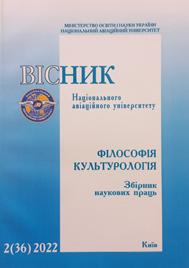THE PROBLEM OF THE CRISIS OF SPIRITUALITY IN THE CONTEXT OF NEW CIVILIZATION CHALLENGES
DOI:
https://doi.org/10.18372/2412-2157.36.16987Keywords:
crisis, spirituality, man, society, culture, civilization, challengesAbstract
Introduction. The beginning of the new millennium can be defined as the time summing up the entire previous history. We got new
opportunities to communicate, discuss our interests on an equal footing, and outline common goals while preserving our individual identities
and our own belief systems. It is recognized that the development of civilization should take place through a progressive approach to
spiritual growth. But at the beginning of the 21st century, the symptoms of the spiritual backwardness of civilizations became threatening,
and therefore the problem of overcoming the spiritual crisis came to the fore. The aim and tasks are to identify the causes and features of
manifestations of the crisis of spirituality on a global scale. Research methods. This research's theoretical and methodological basis is the
works of S. Huntington, O. Spengler, and A. Toynbee. The sociocultural approach, as well as the principles of historicism and systematicity,
are important methodological tools for the study. Research results. Spirituality presupposes the individual's choice of his own life path and
forms a tolerant attitude towards other people. It is recognized that social changes over time lead to the transformation of a person's spiritual
values. And therefore, one of the current important tasks is to live without conflicts with others. Discussion. Humanity is forced to develop
new strategies for human socialization. In the future, the acceleration of exchanging material and spiritual values between different
civilizations and cultures is predicted. The partnership of civilizations is recognized as the most promising scenario for the further
development of the world. Conclusion. New challenges intensify the existing differences in the world community. Existing problems require
long-term cooperation for their solution, which requires a preliminary revival of humanity's spirituality.
References
Гвардини Р. Конец Нового времени. Вопроcы философии. 1990. Вип. 4. С. 144.
Дмитренко М. А. Формування політичної культури суспільства в трансформаційний період : монографія. Київ : Вид-во НПУ імені М. П. Драгоманова, 2006. 192 с.
Кремень В. Г. Філософія людиноцентризму в стратегіях освітнього простору. К. : Пед. думка, 2009. 520 с.
Кримський С. Б. Під сигнатурою Софії. К. : Вид. дім «Києво-Могилянська академія», 2008. 367 с.
Пахомов Ю. Пути и перепутья современной цивилизации. Киев : Изд-во Международный деловой центр, 1998. 254 с. 6. Печчеи А. Человеческие качества. М. : Политиздат, 1980. 326 с.
Підберезних І. Є., Мірошкіна Н. В. Міжцивілізаційні запозичення в історичних концепціях А. Тойнбі та Ф. Броделя. Науковий вісник Ужгородського університету. 2021. Вип. 1 (44). С. 142-151. (Серія «Історія»).
Пода Т. А. Діалог культур як основа розвитку людства (на засадах філософії космізму). Вісник Національного авіаційного університету. 2018. Вип. 1 (27). С. 76-79. (Серія «Філософія. Культурологія»).
Сідоркіна О. М. Самотність у комунікативному процесі сучасної людини. Вісник Національного авіаційного університету. 2020. Вип. 1 (31). С. 93-96. (Серія «Філософія. Культурологія»).
Тойнбі А. Дж. Дослідження історії: у 2 т. Т. 1. К. : Основи, 1995. 401 с.
Фейербах Л. Основные положения философии будущего. Сочинения : в 2 т. Т. 1. М. : Наука, 1995. 502 с.
Філарет. Привітання Патріарха Київського і всієї Руси України учасників конференції «Людство на межі тисячоліть: діалог цивілізацій»: матеріали наук. – практ. конф. (Київ, 23 травня 2003 р.). Київ: Нац. акад. упр., 2003. 329 с.
Філософський енциклопедичний словник / ред. кол.: В. І. Шинкарук (голова) та ін. Київ : Абрис, 2002. 850 с.
Хантингтон С. Столкновение цивилизаций и преобразование мирового порядка: монографія / пер. с англ. Т. Велимеев,
Ю. Новиков. М.: ООО Изд- во АСТ, 2003. 603 с.
Шпенглер О. Закат Европы. Очерки морфологии мировой истории. Т. 1. Образ и действительность. М. : Попурри, 2016. 656 с.


